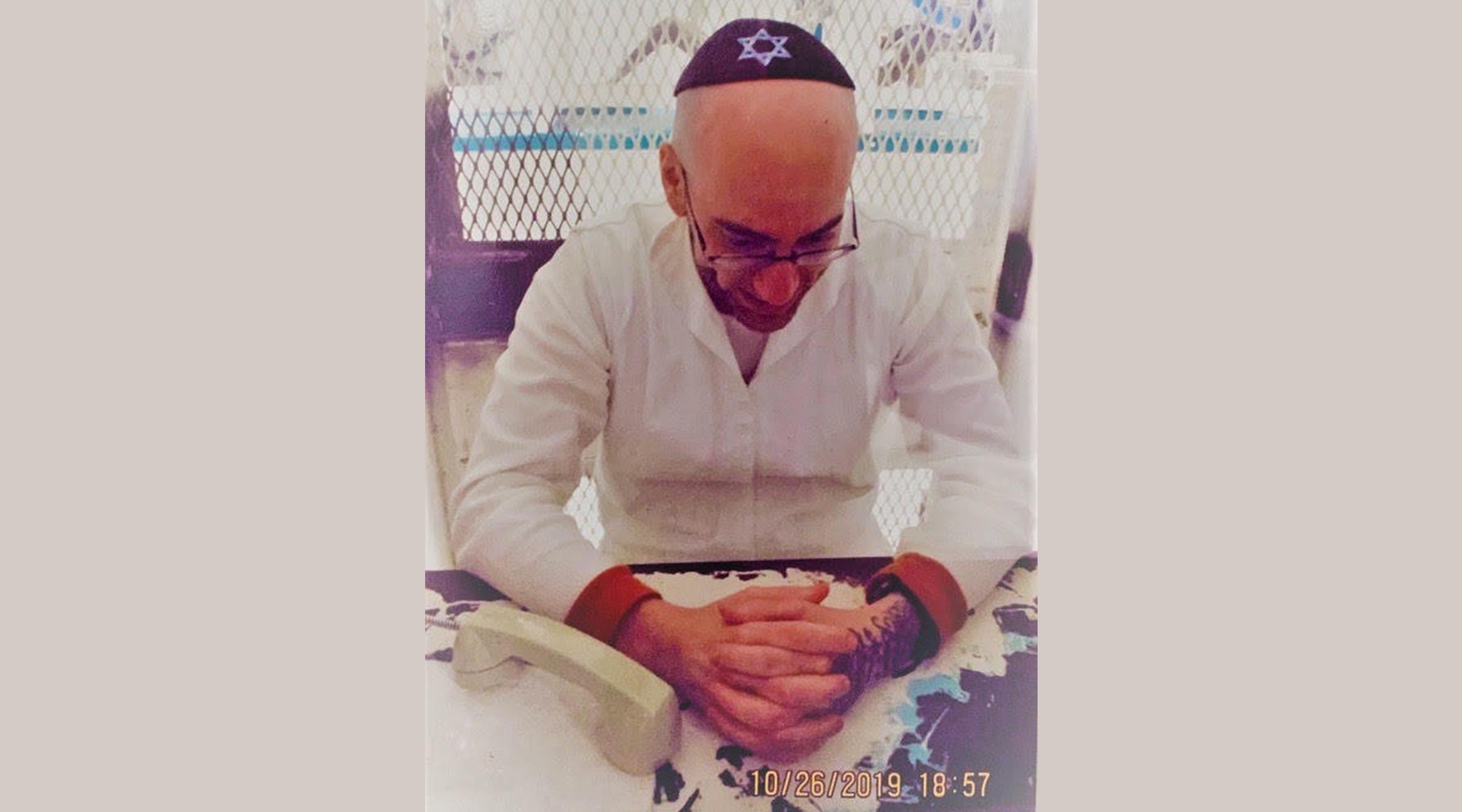Jedidiah Murphy, Jewish man convicted of murder, has been executed in Texas
Murphy’s case had become a cause celebre for several prominent Jewish legal activists

Jedidiah Murphy wears a skull cap that was a gift from one of his supporters, Rabbi Yehuda Eber, in the death row unit at Polunsky prison in Livingston, Texas, Oct. 26, 2019. (Yehuda Eber)
(JTA) — Jedidiah Murphy, the Jewish man on death row in Texas whose fight to avoid the death penalty gained support from prominent Jewish activists, has been executed.
Murphy, 48, was sentenced to death for the fatal 2000 shooting of 80-year-old Bertie Lee Cunningham in Dallas County during a carjacking.
The execution came late on Tuesday, also World Day Against the Death Penalty, after a series of last-minute maneuvers aimed at sparing Murphy.
He had been granted a stay of execution by a federal district court on Friday, but the Attorney General’s Office filed an appeal to vacate the stay. On Tuesday, his attorneys made another request for a stay, arguing that the drugs he was set to be injected with were damaged by smoke and extreme heat during a recent fire at a state prison, but that petition was denied. A last-minute petition to the U.S. Supreme Court was denied.
“I wish I could say it was a shock,” Cantor Michael Zoosman, a former prison chaplain who runs L’Chaim, a Jewish anti-death penalty group, said during an vigil held on Zoom during the last hours of Murphy’s legal fight and then through his execution, just minutes before the expiration of his death warrant.
During the vigil, Zoosman sang “Oseh Shalom” and Psalm 23 from his sukkah and relayed that Murphy, whom he said had become a dear friend and pen pal, had in his final communication expressed sadness about Hamas’ attack on Israel.
“May there be peace, may we see a day with no more killing,” Zoosman said. “Amen.”
Murphy’s case had mobilized Jewish opponents of the death penalty, including Zoosman; Alan Dershowitz, the emeritus Harvard law professor and political commentator; and Rabbi Dovid Goldstein, a Chabad rabbi in Houston who has advocated for Murphy for years.
On Monday, Goldstein, who had guided Murphy in a bar mitzvah ceremony in 2016, accompanied Murphy as he prayed with tefillin for last time.
As a child, Murphy was abused by his birth father and adoptive father, and abandoned his birth mother, who was Jewish, according to the Forward. In the year before committing the murder, Murphy had sought mental health care and was diagnosed with mental dissociative identity disorder, major depression and alcohol dependency, the Texas Observer reported. While he has confessed to the crime, he was high on cocaine and says he does not remember it.
“Three years ago I cried out to Hashem and submitted to his authority and my mind was completely restored,” Murphy wrote in an email from prison to the Jewish Telegraphic Agency last month. “That is a miracle and so do I have faith? Absolutely, because I’ve beaten the odds time and again and I know it is for a reason I don’t fully understand. Being Jewish brought a sense of community and I’ve been blessed with Rabbis that pour into someone that did not deserve it.”
In a message Murphy sent to Zoosman earlier this week, Murphy said the uncertainty of his fate was difficult to handle, but was even more challenging for his family.
“We’ve seen it many times where we’re in a place like this, the day before, there’s a stay in place and you still have the execution carried out,” Zoosman told the Jewish Telegraphic Agency.
Because of that uncertainty, last week, Zoosman sent Murphy a copy of the viddui, a traditional Jewish confessional prayer recited before death.
“I’ve done that many times for people as a hospice and hospital chaplain,” Zoosman explained. “But it also applies here, if in fact he is going to be put to death, then this is the prayer that our tradition offers for someone who’s about to face death.”
This article originally appeared on JTA.org.
A message from our CEO & publisher Rachel Fishman Feddersen
I hope you appreciated this article. Before you go, I’d like to ask you to please support the Forward’s award-winning, nonprofit journalism during this critical time.
We’ve set a goal to raise $260,000 by December 31. That’s an ambitious goal, but one that will give us the resources we need to invest in the high quality news, opinion, analysis and cultural coverage that isn’t available anywhere else.
If you feel inspired to make an impact, now is the time to give something back. Join us as a member at your most generous level.
— Rachel Fishman Feddersen, Publisher and CEO